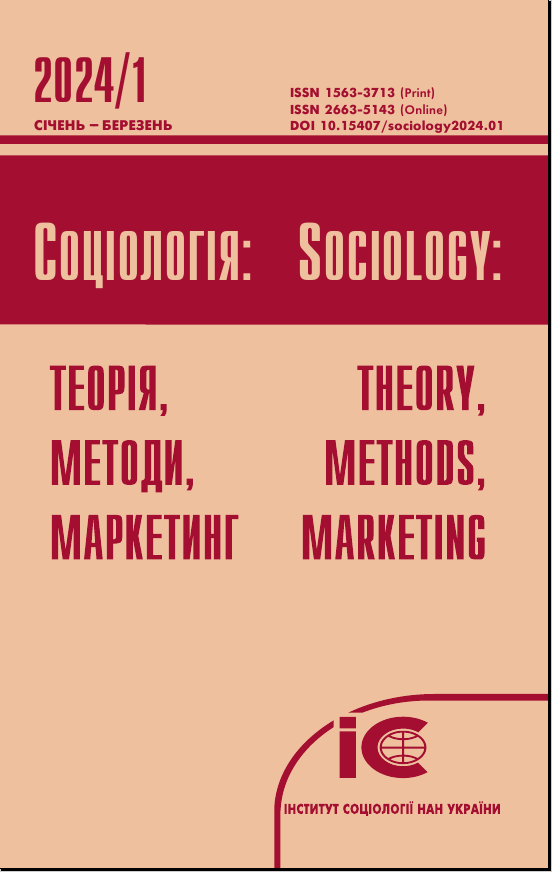Teaching and learning in the first days and weeks of the war between Russia and Ukraine: A presentation at the TASA Social Sciences Week 2022
stmm. 2022 (3): 210-216
OL’HA MAKSYMENKO, MA in Psychology, leading sociologist at the Department of Methodology and Methods of Sociology, Institute of Sociology of the National Academy of Sciences of Ukraine (12 Shovkovychna St., Kyiv, 01021)
olga.maksimenko.65@gmail.com
https://orcid.org/0000-0003-2804-2790
NATALIIA MARCHUK, Health Fundamentals teacher and event manager at the general secondary education institution “Bazylivshchyna Gymnasium of the Mashivka Village Council of the Poltava Oblast” (7 Lesia Ukrainka Valley, Bazylivshchyna village, Mashivka raion, Poltava oblast, 39420)
marchuknataliya74@gmail.com
https://orcid.org/0000-0002-0260-6108
TETIANA ZEMLIANA, piano teacher and accompanist at the communal educational institution “K.F. Dankevych Arts College of Odesa” (32 Dvorianska Street, Odesa, 65023)
tanzem54@gmail.com
https://orcid.org/0000-0002-2323-3494
24 February 2022 marked the beginning of the full-scale attacking stage of the Russia–Ukraine war, which has been going on for over eight years. For security reasons — as the lives of several million Ukrainians were at risk — all educational institutions (schools, colleges, institutes, universities, kindergartens, extracurrirular classes, etc.) had to be temporarily closed. A letter from the Ministry of Education and Science of Ukraine with a recommendation to temporarily stop the educational process was published on the second day of the war. It became possible to resume the educational process at schools (although just partially and remotely) only after March 14. Clearly, it could be feasible only for those educational institutions that were located in regions/districts where no active hostilities were taking place or in territories that were not occupied. However, a significant number of teachers kept in touch with their students, despite the danger. Teachers were often preparing for classes and having lessons even in bomb shelters, communicating with students who by that time might already have been outside Ukraine. In relatively safe areas, almost all teachers and school principals participated in volunteering activities. This article is centred on the work of educational institutions during the first days and weeks of the war, as well as on the efforts of teachers aimed at ensuring the educational process under these extraordinary circumstances. Excerpts from interviews with Ukrainian teachers (posted on educational websites or conducted personally) served as sources of empirical data. There are also several examples of online classes and extracurricular activities of that time. The text of the article (together with personal teaching/learning materials and drawings of the participants of the all-Ukrainian competition “War through the eyes of children”) was used by the authors during a presentation at the Social Sciences Week hosted by the Australian Sociological Association. The event took place from 5 to 11 September 2022.
Keywords: Russia–Ukraine war, Ukrainian schools, educational process, distance learning, online lessons, creative teaching/learning materials
Teaching and learning in the first days and weeks of the war between Russia and Ukraine: A presentation at the TASA Social Sciences Week 2022
stmm. 2022 (3): 210-216
OL’HA MAKSYMENKO, MA in Psychology, leading sociologist at the Department of Methodology and Methods of Sociology, Institute of Sociology of the National Academy of Sciences of Ukraine (12 Shovkovychna St., Kyiv, 01021)
olga.maksimenko.65@gmail.com
https://orcid.org/0000-0003-2804-2790
NATALIIA MARCHUK, Health Fundamentals teacher and event manager at the general secondary education institution “Bazylivshchyna Gymnasium of the Mashivka Village Council of the Poltava Oblast” (7 Lesia Ukrainka Valley, Bazylivshchyna village, Mashivka raion, Poltava oblast, 39420)
marchuknataliya74@gmail.com
https://orcid.org/0000-0002-0260-6108
TETIANA ZEMLIANA, piano teacher and accompanist at the communal educational institution “K.F. Dankevych Arts College of Odesa” (32 Dvorianska Street, Odesa, 65023)
tanzem54@gmail.com
https://orcid.org/0000-0002-2323-3494
24 February 2022 marked the beginning of the full-scale attacking stage of the Russia–Ukraine war, which has been going on for over eight years. For security reasons — as the lives of several million Ukrainians were at risk — all educational institutions (schools, colleges, institutes, universities, kindergartens, extracurrirular classes, etc.) had to be temporarily closed. A letter from the Ministry of Education and Science of Ukraine with a recommendation to temporarily stop the educational process was published on the second day of the war. It became possible to resume the educational process at schools (although just partially and remotely) only after March 14. Clearly, it could be feasible only for those educational institutions that were located in regions/districts where no active hostilities were taking place or in territories that were not occupied. However, a significant number of teachers kept in touch with their students, despite the danger. Teachers were often preparing for classes and having lessons even in bomb shelters, communicating with students who by that time might already have been outside Ukraine. In relatively safe areas, almost all teachers and school principals participated in volunteering activities. This article is centred on the work of educational institutions during the first days and weeks of the war, as well as on the efforts of teachers aimed at ensuring the educational process under these extraordinary circumstances. Excerpts from interviews with Ukrainian teachers (posted on educational websites or conducted personally) served as sources of empirical data. There are also several examples of online classes and extracurricular activities of that time. The text of the article (together with personal teaching/learning materials and drawings of the participants of the all-Ukrainian competition “War through the eyes of children”) was used by the authors during a presentation at the Social Sciences Week hosted by the Australian Sociological Association. The event took place from 5 to 11 September 2022.
Keywords: Russia–Ukraine war, Ukrainian schools, educational process, distance learning, online lessons, creative teaching/learning materials
